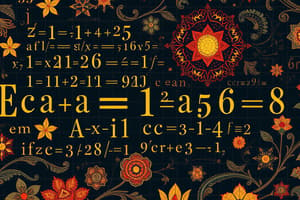Podcast
Questions and Answers
What does coefficient mean?
What does coefficient mean?
The amount that a letter has been multiplied by.
What does difference mean?
What does difference mean?
The answer to the subtraction of two numbers.
What is a factor?
What is a factor?
A number which divides exactly into another number.
What is a factor pair?
What is a factor pair?
What is the highest common factor?
What is the highest common factor?
What is an integer?
What is an integer?
What is the perimeter?
What is the perimeter?
What are powers?
What are powers?
What's a prime number?
What's a prime number?
What's a product?
What's a product?
What is the quadratic equation?
What is the quadratic equation?
What is a sum?
What is a sum?
What is a term?
What is a term?
What are expressions in algebra?
What are expressions in algebra?
How is the perimeter of a rectangle defined?
How is the perimeter of a rectangle defined?
What does simplifying expressions involve?
What does simplifying expressions involve?
Flashcards are hidden until you start studying
Study Notes
Coefficient
- A coefficient indicates the amount multiplied by a variable, e.g., in 3a, the coefficient of a is 3.
Difference
- The difference is the result of subtracting one number from another; for example, the difference between 8 and 2 is 6.
Factor
- A factor is a number that divides another number exactly, with 1 being a factor of all numbers; factors of 10 include 1, 2, 5, and 10.
Factor Pair
- Factor pairs consist of two factors that, when multiplied together, yield a particular product.
Highest Common Factor (HCF)
- The HCF of two numbers is the largest number that divides both; for instance, the HCF of 24 and 36 is 12.
Integer
- Integers are whole numbers, which can be positive, negative, or zero.
Perimeter
- The perimeter is the total distance around a shape, determined by adding the lengths of all its sides.
Powers
- Powers represent a number multiplied by itself a specified number of times.
Prime Number
- A prime number has exactly two factors: 1 and itself.
Product
- The product refers to the outcome of multiplying two numbers; for example, the product of 5 and 8 is 40.
Quadratic Equation
- A quadratic equation is one where the highest power of a variable is 2, e.g., 2x².
Sum
- A sum is the result of adding numbers together; for instance, the sum of 8 and 4 is 12.
Term
- Terms are the individual components of expressions or equations, like 7a or 4 in the expression 7a + 4.
Expressions and Equations
- In algebra, letters represent values that can change (variables) or unknown values. An expression combines terms using operations (+, -, ×, ÷), while an equation states that two expressions are equal.
Identical and Identity
- An identity is a true statement for all variable values; for example, 4a × a² = 4a³ is always true.
Rectangle Perimeter Example
- The perimeter of a rectangle can be calculated by adding the lengths of all sides: for width (x) and height (x - 3), it results in (4x - 6).
Simplifying Expressions
- Simplifying involves collecting like terms in an expression, such as combining 5a and 3a, or 2b and -6b for clarity and efficiency.
Studying That Suits You
Use AI to generate personalized quizzes and flashcards to suit your learning preferences.




